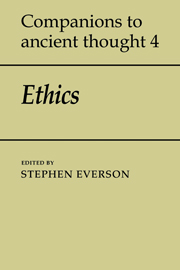Book contents
- Frontmatter
- Contents
- 1 Introduction: virtue and morality
- 2 Pre-Platonic ethics
- 3 Platonic ethics
- 4 Aristotle on nature and value
- 5 Some issues in Aristotle's moral psychology
- 6 The inferential foundations of Epicurean ethics
- 7 Socratic paradox and Stoic theory
- 8 Doing without objective values: ancient and modern strategies
- 9 Moral responsibility: Aristotle and after
- Bibliography
- Index of names
- Index of passages discussed
- Index of subjects
4 - Aristotle on nature and value
Published online by Cambridge University Press: 05 June 2012
- Frontmatter
- Contents
- 1 Introduction: virtue and morality
- 2 Pre-Platonic ethics
- 3 Platonic ethics
- 4 Aristotle on nature and value
- 5 Some issues in Aristotle's moral psychology
- 6 The inferential foundations of Epicurean ethics
- 7 Socratic paradox and Stoic theory
- 8 Doing without objective values: ancient and modern strategies
- 9 Moral responsibility: Aristotle and after
- Bibliography
- Index of names
- Index of passages discussed
- Index of subjects
Summary
In the last twenty years or so, the account of happiness given in the Nicomachean Ethics (EN) must have received as much scholarly attention as has ever been given to any philosophical treatment of anything. Not all commentators, however, are agreed that what Aristotle has to say there about happiness is sufficiently interesting to merit intense critical scrutiny. So, Sir Anthony Kenny, who has himself written quite extensively on the topic, concludes that
Aristotle's belief that the pursuit of happiness must be the pursuit of a single dominant aim, and his account of the nature of philosophy, seem to be both so seriously mistaken as to make unprofitable a discussion of his arguments that happiness consists in theoria.
On Kenny's reading of the EN, Aristotle begins by assuming that the good life will be one in which the agent centres his life on a particular good and finishes by identifying that good as the activity of theōria, intellectual activity. Understandably, Kenny finds this view of happiness far from compelling.
In reading Aristotle in this way, Kenny stands on one side of a longrunning debate about what conception of happiness underlies the argument of the EN. In contrast to Kenny, many scholars have maintained that the conception of happiness in place until book x is rather an ‘inclusive’ one – i.e. one which would allow many goods to be included within happiness as its constituents.
- Type
- Chapter
- Information
- Ethics , pp. 77 - 106Publisher: Cambridge University PressPrint publication year: 1998
- 3
- Cited by

